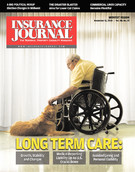Republicans made big gains across the United States – and the Midwest was no exception – in the November 2 midterm elections. Across the country, GOP gains gave the party its largest number of seats in state legislatures since the Great Depression, according to the National Conference of State Legislatures (NCSL).
Republicans now hold about 3,890, or 53 percent, of the total state legislative seats in the United States, the most seats in the GOP column since 1928. The GOP will now control at least 54 of the 99 state legislative chambers, its highest number since 1952. As a result, state legislatures will likely reflect a more conservative political agenda when they convene in 2011, NCSL reported.
Tim Storey, elections specialist with NCSL, said, “2010 will go down as a defining political election that will shape the national political landscape for at least the next 10 years. The GOP, in dramatic fashion, finds itself now in the best position for both congressional and state legislative line drawing than it has enjoyed in the modern era of redistricting.”
Midwest Changes
In Kansas, Insurance Commissioner Sandy Praeger, a Republican, was re-elected without opposition, but other Midwestern insurance commissioners may be looking for new jobs next year as a result of changes in a number of governors’ offices. Voters elected new Republican governors in Iowa, Kansas, Michigan, Ohio and Wisconsin. Many of the newly-elected governors are expected to appoint new insurance commissioners.
In Iowa, Terry Branstad, who previously served as Iowa’s governor from 1983 to 1999, promised to make quick decisions as he begins his fifth term as governor. Branstad ousted Democratic incumbent Chet Culver.
After 16 years in the U.S. Congress, Republican Sam Brownback is coming home to be governor of Kansas with a budget crisis looming. He succeeds Democrat Mark Parkinson, who did not run for re-election. Brownback beat Democratic state Sen. Tom Holland to reclaim the office held by Democrats for the past eight years.
Michigan’s Governor-elect Rick Snyder, an Ann Arbor businessman, prevailed over Democrat Virg Bernero. Outgoing Democratic Gov. Jennifer Granholm was term-limited. Snyder has vowed to eliminate the current complicated and unpopular business tax and replace it with a flat corporate tax, according to Stateline.org. Michigan will face a $1.4 billion budget gap for 2012.
Republican John Kasich, a former congressman and Lehman Brothers banker, defeated incumbent Ohio Democratic Gov. Ted Strickland. Ohio faces a potential $8 billion deficit in 2011.
In Wisconsin, Republican Scott Walker succeeds Democrat Jim Doyle, who did not run for a third term. Walker defeated Democrat Tom Barrett. Wisconsin faces a $2.7 billion budget shortfall.
Nebraska Gov. Heineman, a Republican, retained his office after soundly defeating his Democratic challenger Mike Meister.
Republican Gov.-elect Dennis Daugaard kept South Dakota’s governor’s office in the GOP’s hands after defeating Democratic Sen. Scott Heidepriem. He succeeds Mike Rounds, a Republican who is term limited.
Incumbent Illinois Gov. Pat Quinn prevailed over his Republican opponent, state Sen. Bill Brady, by a slight margin.
At press time Minnesota Democrat Mark Dayton held a slim lead over Republican nominee Tom Emmer in the governor’s race, however, the official results were undecided and a recount a possibility.
Based on unofficial, preliminary returns, Midwestern state legislative chambers that switched the balance of power are: Indiana House; Iowa House; Michigan House; Minnesota House and Senate; Ohio House; and Wisconsin Assembly and Senate. The Minnesota Senate, which held nonpartisan elections until 1974, is under Republican control for the first time.
The GOP and Michigan Supreme Court
Republicans regained control of the Michigan Supreme Court by capturing two seats, riding the same electoral wave that made the GOP victorious in all major statewide races. Wayne County Judge Mary Beth Kelly and incumbent Justice Robert Young Jr. beat the three other candidates. The result means conservatives will form a 4-3 majority on the court beginning in January, after two years in which Democrats largely had control.
Backed by business groups, Young and Kelly promoted themselves as conservatives who wouldn’t second-guess the Legislature and make their own law.
Since 2009, the Democratic-controlled court has reversed some key decisions of its former conservative majority, especially in auto-injury law and insurance. Young and Kelly, however, suggested they wouldn’t be eager to revisit the cases.
Was this article valuable?
Here are more articles you may enjoy.


 Insurify Starts App With ChatGPT to Allow Consumers to Shop for Insurance
Insurify Starts App With ChatGPT to Allow Consumers to Shop for Insurance  Insurance Broker Stocks Sink as AI App Sparks Disruption Fears
Insurance Broker Stocks Sink as AI App Sparks Disruption Fears  Chubb CEO Greenberg on Personal Insurance Affordability and Data Centers
Chubb CEO Greenberg on Personal Insurance Affordability and Data Centers  US Appeals Court Rejects Challenge to Trump’s Efforts to Ban DEI
US Appeals Court Rejects Challenge to Trump’s Efforts to Ban DEI 


